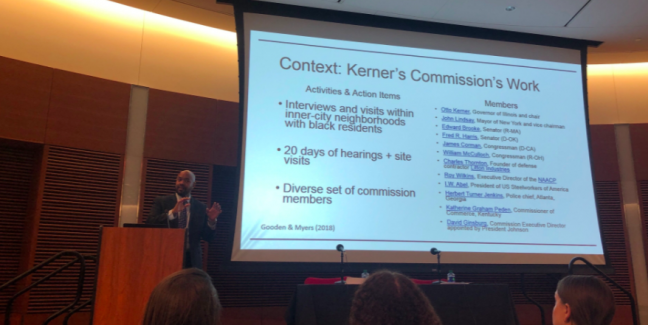Institute for Research on Poverty and LaFollette School of Public Affairs hosted professor Bradley Hardy and president of the Eisenhower Foundation Alan Curtis Monday night to discuss racial disparities 50 years after the Kerner Commission report was first formed.
The Kerner Commission report, also known as the National Advisory Commission on Civil Disorders was formed by President Lyndon B. Johnson in 1967. The commission, which was created to examine the protests that were occurring in many American cities at the time, found that America was very segregated.
“Our Nation is moving toward two societies, one black, one white — separate and unequal,” the report said.
Hardy began the discussion by giving context to the report, saying that in the 1960s civil unrest was high and racial disparities were wide. The commission traveled to neighborhoods and conducted interviews and hearings to learn about the African American experience on the “ground level,” Hardy said.
Rutgers professor discusses racial tensions, disparities in public health policy
Hardy said that the commission’s goal was to determine why the riots were happening and come up with a way for policymakers to stop them. The commission came up with three recommendations: open opportunities for those restricted by racial segregation, remove the frustration of powerlessness among disadvantaged communities and increase cross-race dialogue and communication nationwide.
The commission focused on employment, educational opportunities, fair housing and issues of police brutality when they made these recommendations, Hardy said. He added that these are still issues we face today.
“I don’t think this is even a partisan statement that these are issues that are still prominent 50 years later,” Hardy said.
Curtis said that when he went to high school in Milwaukee during the 1950s there was not a single person of color in his class, adding that now Milwaukee is the most segregated city in the U.S.
While the increasing diversity of elected officials and the expansion of the African American middle class are both signs of progress, there is still a lot to be done, Curtis said.
“Mass incarceration really is our current version of slavery and Jim Crow,” Curtis said.
He found that when looking at national trends such as unemployment rates and poverty, neighborhoods affected by the rioting had higher rates than black neighborhoods and that black neighborhoods have had higher rates than overall neighborhoods.
Wisconsin’s history of associating black skin with slavery still harmful today, UW professor says
Hardy looked into the changes in both black neighborhoods and those where the riots occurred to see how they have evolved in the 50 years since the commission. Both Hardy and Curtis had several ideas on how to improve racial disparities moving forward. Curtis said that the country should focus on evidence-based policies.
“Evidence-based policy that works targets multiple solutions to multiple problems, evidence-based policy is complementary and interdependent,” Curtis said.
Hardy agreed with Curtis, saying that public policy interventions have worked.
“I don’t think that it’s socialism to promote strong social policies within a market economy,” Hardy said.
Hardy recommended the increase of social programs such as Earned Income Credit and the Supplemental Nutrition Assistance Program.
Curtis asked students and faculty of the University of Wisconsin to help spread the word on the lack of progress in reducing inequality and racial injustice and went on to say that the solution lies in “good government.”
“Good government now must invest in Kerner priorities at the scale equal to the dimensions of the problem,” Curtis said.
















